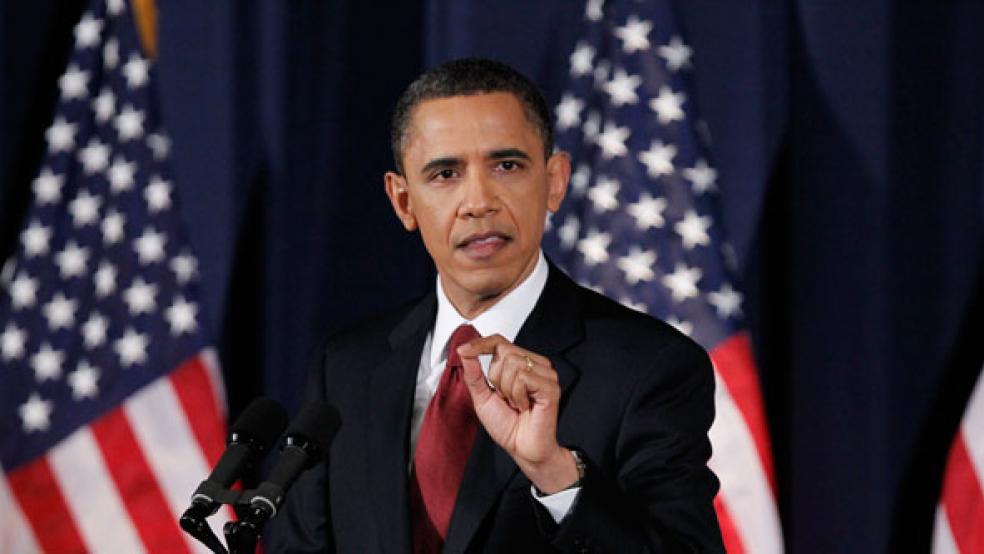In his first nationally televised speech explaining recent U.S. actions in Libya, President Obama promised Monday night to limit the nation’s military involvement in that war torn country even as it continued to seek the ouster of dictator Muammar el-Qaddafi, whose army is battling rebel forces 45 miles east of Tripoli.
Underscoring that pledge, the president announced that NATO forces have taken over enforcing the arms embargo and no- fly zone over Libya, and on Wednesday will be protecting civilians on the ground. “While our military mission is narrowly focused on saving lives, we continue to pursue the broader goal of a Libya that belongs not to a dictator, but to its people,” Obama said.
In defending the first war launched during his presidency, Obama argued that U.S. “interests and values” were at stake in his decision to intervene in Libya to prevent a slaughter and repression of civilians along with a looming humanitarian crisis. “Qaddafi declared that he would show ‘no mercy’ to his own people,” Obama said during a nearly 30-minute speech at the National Defense University in Washington, D.C. “He compared them to rats, and threatened to go door to door to inflict punishment. In the past, we had seen him hang civilians in the streets, and kill over a thousand people in a single day . . . It was not in our national interest to let that happen. I refused to let that happen.”Obama added, “I can report that we have stopped Qaddafi’s deadly advance.”
The president’s speech came after a week of withering criticism from Capitol Hill, where critics across the political spectrum have attacked the administration’s actions during the unfolding democracy revolution sweeping across North Africa. Critics on the left have blasted the president for intervening abroad when the nation faces huge budget cuts and high unemployment. Critics on the right have castigated the administration for failing to commit ground forces to immediately overthrow Qaddafi.
Senate Minority Leader Mitch McConnell, R-Ky., took to the floor of the Senate on Monday afternoon to castigate the administration for issuing confusing and conflicting information about the ultimate military objective in Libya. “The president has articulated a wider political objective of regime change in Libya that is not the stated objective of our military intervention,” McConnell said, “nor is it the mandate of the UN resolution that the president has used as justification for our military efforts there.”
Like Rep. Dennis Kucinich, D-Ohio, who last week called the president’s failure to seek Congressional approval for sending the military into action a violation of the War Powers Act, McConnell also criticized the administration for taking action “without adequate consultation with Congress.” McConnell said U.S. action should be “limited in scope and duration,” or the president should ask Congress to vote on the issue.
The president also has strong support on the Hill for taking action in Libya. “Qaddafi is a terrorist, the moral equivalent of Osama bin Laden,” said Sen. Robert Menendez, D-N.J. Qaddafi “ordered the bombing of Pan Am Flight 103, which killed 270, including 34 New Jerseyans,” he said in a statement. Senior Senate Democrats like Carl Levin of Michigan and Richard J. Durbin of Illinois are also backing the president.
Republican foreign policy experts on Capitol Hill gave a mixed verdict on the president’s action. “The fact is that Qadaffi said he'd go house to house and kill people, and thankfully at the 11th hour with the quote-unquote 'no fly zone,' we prevented that,” Sen. John McCain, R-Ariz., said on Fox News Sunday. “This is a moment of historic proportions, and this will give us a moment of opportunity to help with the spread of democracy.”
But Sen. Richard Lugar, R-Ind., said on NBC’s Meet the Press that “I think there should have been a plan for what our objectives were, a debate as to why this was in our vital interest before we committed military forces to Libya.”
“America has an important strategic interest in preventing Qaddafi from overrunning those who oppose him,” the president said. “A massacre would have driven thousands of additional refugees across Libya’s borders, putting enormous strains on the peaceful yet fragile transitions in Egypt and Tunisia.”
He also said the initial U.S. effort to stop Qaddafi’s forces from overwhelming the eastern Libyan city of Benghazi was necessary to uphold the authority of the United Nations, which had passed a resolution condemning the Libyan dictator’s actions and calling for humanitarian intervention. “The writ of the UN Security Council would have been shown to be little more than empty words, crippling its future credibility to uphold global peace and security,” he said.
But even as the president spoke, the next phase of the military intervention in Libya was unfolding about 45 miles east of Tripoli, where rebel forces were bogged down in the desert outside Bin Jawwad, one of Qaddafi’s key outposts on the road to Tripoli, the nation’s capital. American military officials warned that without ongoing NATO-backed air support, the rebels would be quickly overwhelmed by Qaddafi’s army.
“The regime still vastly overmatches opposition forces militarily,” Gen. Carter F. Ham, the ranking American in the coalition operation, warned in an e-mail message on Monday, according to the New York Times. “The regime possesses the capability to roll them back very quickly. Coalition air power is the major reason that has not happened.”
Related Links:
President Obama on Libya (The New York Times)
Obama on Libya: 'We have a responsibility to act' (San Francisco Chronicle)


